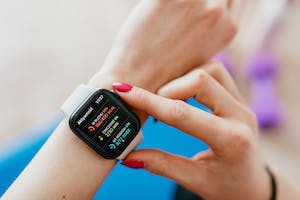What is wearable technology? It refers to any device that can be worn as jewelry, clothing, or even implanted into the human body.
Sometimes called “wearables,” they can be in the form of clothing accessories or even smartwatches. Fitness bands, smart watches, and health trackers are among the most popular, but there are also wearables that help with health monitoring, such as wearable blood pressure monitors.
With the widespread popularity of wearable technology, many different companies have created devices that serve a wide range of purposes. Currently, the devices aren’t advanced enough to replace smartphones, but some analysts predict that this will soon change. Either way, wearable technology is a rapidly growing industry.
Wearable Technology and Its Use
Wearable technology is here to stay, and every industry must know about and utilize it. Wearables are transforming our daily lives and becoming an integral part of our smart lives. With the inclusion of wearables into our daily lives, it is vital that we are all knowledgeable enough about how to use them properly.
When picking, implementing, and using wearables, the most crucial piece of advice is ensuring that the device’s physiological, medical, social, and emotional consequences are thoroughly understood.
Smart Jewelry
Smart jewelry can function as an activity tracker, a sleep monitor, a stress reliever, or a comprehensive fitness device. It could be a wristwatch, a bracelet, a ring, or a clip. This wearable is a great alternative to manual tracking of your health or anything you want to keep track of in your daily life.
Smart Clothing
Smart clothes can provide more in-depth insights than other types of modern wearable technology, allowing for extensive tracking for both monitoring health and lifestyle enhancement.
There are smart socks that sense foot ulcers and yoga pants that vibrate when activated to improve muscle loss or gain during a yoga session. Another great example of smart clothing is a type of swimwear that determines when it is time to reapply sunscreen.
Smart Shoes
They are capable of detecting and recording data from the user’s daily activities. Sensors, vibrating motors, GPS, wireless systems, and numerous data transmission devices are built into such smart shoes.
They can function as fitness trackers, but they can also communicate with and support visually impaired people in the same manner as fitness trackers. It’s great to witness the future of technology unfold in such a spectacular way.
Smart Glasses
Smart Glasses are eye or head-worn wearable computers that provide the user with essential functions. Many smart glasses incorporate displays that modify or complement what the wearer sees. These glasses can indeed record video or take photos, and a few of them have built-in audio that can be downloaded to your devices.
Implantable Technology
Implantable technology, also known as “embeddable technology,” refers to devices that can be implanted directly into the human body to modify, improve, or cure in ways that non-embedded technologies cannot.
This type of technology is becoming increasingly commonplace as medical advancements are made, and more people are open to the idea of having devices implanted into their bodies. In addition, implantables are now common for pets to track them as well.
Fitness Tracker
Modern trackers can measure everything from your heart’s health to your oxygen levels and blood pressure, as well as how well you’ve recovered from strenuous exercise. Fitness trackers include sensors, GPS, and other tracking devices.
Whatever your fitness objectives are, there is almost certainly a fitness tracker that can help you accomplish them. As is customary, these are supported by Bluetooth or an internet connection. The most popular fitness trackers today are from Apple and Samsung.
The Benefits of Wearable Technology
Wearable technology has many applications. It was designed to make our lives more convenient and pleasant, especially if we have a certain goal to attain. These will assist us in achieving our objectives in whatever form they may take; fitness, fashion, or even your way of life.
Wearables will remind you that useful technology isn’t just for social media or indulgences but also for maintaining our health in small but significant ways.
Wearables are convenient
Wearable technology allows us to track our fitness levels, track our whereabouts via GPS, and view emails and texts more efficiently. Best of all, the majority of the devices that enable us to do so are hands-free and lightweight, reducing the need to take our devices out of our pockets and become distracted by other things.
Wearables are discreet
Many people wear watches or bracelets. Although few people have cameras mounted to their faces, research appears to suggest that people are far more inclined to adopt wearable tech if it can be effortlessly blended into their attire and does not appear to be an extraneous sensor at all. It can also help your security without you even realizing it.
Wearables can increase your productivity
Some wearables can help boost productivity. Because it is linked to your smartphone, you may store all of your important tasks on your wearable, and it will alert you and update you on what needs to be done. Most wearables can also remind you of your upcoming fitness activity or schedule.
Key Takeaways
Wearable technology is currently popular in our society, with so much advancement in this field, it’s no surprise. Most of these devices can help us be more productive and effective in our daily chores by removing the need for us to utilize our smartphones for specific tasks.
It can be difficult to decide which wearable device to try first. Watches and fitness bands are the most popular, but some devices are used for monitoring baby health, guns, and environmental pollutants.
The technology that these wearable devices offer us is changing so quickly that it’s difficult to predict which device will be the most useful. If you’re looking for a wearable that will fulfill your requirements, this article will introduce you to the possibilities of wearable technologies.
Author Bio
Rachel Miller is a certified Sport and Fitness Enthusiast who works as a Personal Trainer at Nordic Lifting. Her Fitness Goal is to set physical challenges that will empower individuals like her to push through and become confident persons. Plus, she loves to present her passion and knowledge of fitness and weightlifting through writing.








